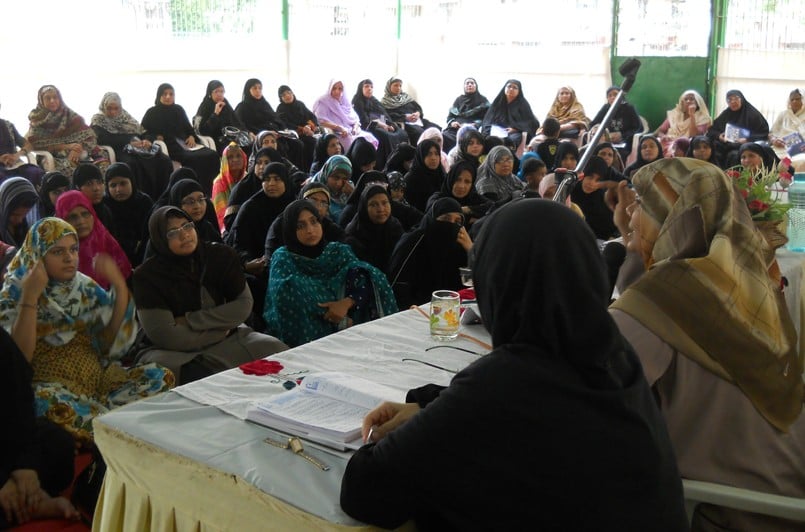
In a drastic shift towards women’s political participation, JI includes ten women in its 70 member shura and JUI-F formally announces to launch its women wing

Although religious parties in Pakistan traditionally hold conservative views about women and are opposing the bill that protects women from abuse and domestic violence, two of the country’s leading religio-political parties have recently shown a drastic shift in their approach towards women’s political participation.
For the first time in its 75 year long history, the Jamaat-e-Islami (JI) has included ten women in its 70-member shura, the central decision-making body. Also, the Jamiat-e-Ulema Islam-Fazl (JUI-F), another key religio-political party, has formally announced to launch its women wing, opening its membership for women in a radical break from the party’s tradition.
Political analysts term this decision by the two parties as a good sign to facilitate women empowerment. Although the JI has a well-organised and active women front since the party’s formation, the recent focus of the JUI-F on bringing women to its fold is surprising.
Samia Raheel Qazi, a leader of JI and daughter of party’s former chief Qazi Hussain Ahmed, says the party’s women members from all regions will elect ten women to send them in the shura while the women’s wing’s central secretary general would be a shura member, because of her key designation.
"It is true that women will formally be a part of shura for the first time. But as observers, women have been attending the shura meetings for the past several decades," Qazi tells TNS. "At the time of formation of the party, the JI founder Abul A’la Maududi had launched the women wing which, since then, has been active in entire country."
The presence of a large number of veiled women activists, some even with babies in tow, in the JI’s pro-Mumtaz Qari rally in Karachi on March 20 corroborate Qazi’s claims.
However, analysts believe the JI’s leadership’s decision to include women in its central decision-making body appears to be part of a shift in the party towards a more liberal look. "They [JI leadership] have now started concentrating on other fronts, such as youth, women, non-Muslims communities, social media and charity and also struggling to revamp their work on the diplomatic front," says a Lahore-based political analyst who has been affiliated with the Jamaat in the past.
For the first time in the party’s history, the JI, two years ago, had invited non-Muslims to attend their three-day long annual congregation and set up a separate enclosure there for Christians, Hindus and Sikhs.
On the other hand, the JUI-F which was previously opposed to women’ role in active politics has also opened its membership for women. Shahida Akhter Ali, and Naeema Kishwer, both MNAs elected on reserved seats from Khyber Pakhtunkhwa, have been appointed central president and secretary general respectively and tasked to organise the party’s women wing in all regions.
Analysts believe that after its defeat in the last general and local government polls, the JUI-F leadership has had this realization that they need to bank on the women voters in future.
Munir Ahmed Shah, a Karachi-based journalist who covers religious parties extensively, says that the most of the candidates of JUI-F in both national and local government polls, especially in Khyber Pakhtunkhwa, were defeated because they did not receive enough votes at the women’s polling stations.
"Also, allocation of 30 percent seats in National Assembly and four provincial assemblies as well as hundreds of seats reserved for women in local government polls have forced the JUI-F to bring women into practical politics," says Shah.
The JUI-F has mainly focused on recruiting teachers and students of Deobandi religious seminaries for women. "In the party’s support base, the Pashtun constituents, it is very difficult for all parties, including the liberal Awami National Party and the Pakistan People’s Party, to enroll women at village or town level because of social constraints," says a former male MNA of the JUI-F in Khyber Pakhtunkhwa. "Therefore our party’s main focus is on religious seminaries spread across the country."
Although there are no official statistics available, media reports suggest there are more than 500 Deobandi religious seminaries for women, with some 30,000 women students enrolled. Most of them are connected with the JUI-F.
The JUI-F leaders argue the party’s launching a separate chapter for women would also stop women students of seminaries from joining the jihadi groups. "We have a good example of Lal Masjid, where local clerics used female students in anti-state activities," the JUI-F leader says. "It will encourage them to play a key role in the country’s politics."
A section of analysts hail the shift in the two religious parties’ approach towards women’s political participation. Afiya S. Zia, a Karachi-based sociologist, says the JI and the JUI-F are very different in their approach regarding women-related issues. "In the JI, women are already active and empowered and recent induction of ten women in its shura is encouraging," Zia says. "But we have to see whether they will have power in the party’s decision-making process". She says pressures from the democratic process have pushed the two parties to take such decision.